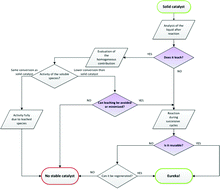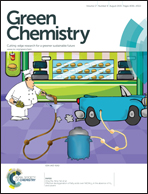Deactivation of solid catalysts in liquid media: the case of leaching of active sites in biomass conversion reactions
Abstract
This review is aimed to be a brief tutorial covering the deactivation of solid catalysts in the liquid phase, with specific focus on leaching, which can be especially helpful to researchers not familiarized with catalytic processes in the liquid phase. Leaching refers to the loss of active species from the solid that are transferred into the liquid medium, causing eventually a deactivation of the catalyst. Intriguingly, not many published studies have dealt with leaching, since this is a specific phenomenon in the liquid phase and heterogeneous catalysis is mainly carried out in gaseous phase. However, as a consequence of the development of new processes for biorefineries, an increasing number of reactions deal with liquid media, and thus, the stability and reusability of a solid catalyst in this situation represent a huge challenge that requires specific attention. Leaching of active phases is particularly problematic because of its irreversibility and it can be one of the main causes of catalyst deactivation in liquid media, threatening the sustainability of the process. This tutorial review presents a survey of the main aspects concerning the deactivation due to leaching of active species from the solid catalyst such as mechanisms, detection methods, impact of these factors on global activity and finally, some procedures to try and minimize the leaching or to cope with it. A decision flowchart is presented to help in the study of catalyst stability and reusability. Interesting biomass conversion reactions have been chosen as examples to illustrate the importance of these aspects.



 Please wait while we load your content...
Please wait while we load your content...